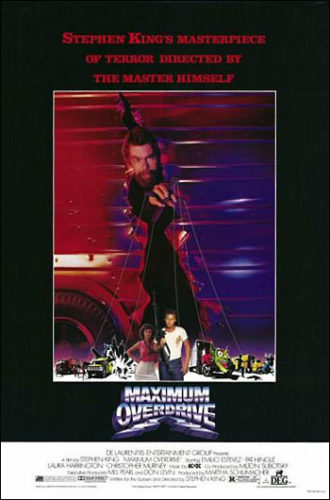 This is the infamously bad directorial debut of Stephen King. He was admittedly at the height of his substance abuse problems when this 1986 bomb was made, which partially explains why it’s so lousy. It was based on King’s 1973 story “Trucks,” a minimalistic account of driverless big rigs besieging the inhabitants of a rural truck stop. That’s pretty thin material for a special effects laden feature, although King doesn’t appear to have recognized that fact. Nor, evidently, did the late Dino de Laurentiis, who unwisely bankrolled a film that joined mega-bombs like DUNE and TAI-PAN, and helped bring down the short-lived De Laurentiis Entertainment Group. Ultimately, the best thing I can say for MAXIMUM OVERDRIVE is that it isn’t much worse than 1997’s TRUCKS, a USA Network TV movie based on the same source material.
This is the infamously bad directorial debut of Stephen King. He was admittedly at the height of his substance abuse problems when this 1986 bomb was made, which partially explains why it’s so lousy. It was based on King’s 1973 story “Trucks,” a minimalistic account of driverless big rigs besieging the inhabitants of a rural truck stop. That’s pretty thin material for a special effects laden feature, although King doesn’t appear to have recognized that fact. Nor, evidently, did the late Dino de Laurentiis, who unwisely bankrolled a film that joined mega-bombs like DUNE and TAI-PAN, and helped bring down the short-lived De Laurentiis Entertainment Group. Ultimately, the best thing I can say for MAXIMUM OVERDRIVE is that it isn’t much worse than 1997’s TRUCKS, a USA Network TV movie based on the same source material.
MAXIMUM OVERDRIVE, inexplicably enough, has acquired a cult following in recent years (due, I’m guessing, to misplaced eighties nostalgia). But keep in mind that Stephen King himself admits this movie sucks; in answer to an interviewer who questioned why he hasn’t directed another movie, he said “just watch MAXIMUM OVERDRIVE.”
The story: the Earth is passing through the tail of a comet, causing machines to go crazy (most of the machines, that is, as the cars driven by the movie’s heroes, and a boat they eventually man, remain subservient to humans). In Wilmington, North Carolina an ATM machine calls its user (who looks suspiciously like Stephen King) as “asshole,” a bridge rises while cars are driving over it, and a soda machine shoots out cans that kill several little leaguers—who are then crushed by a steam roller!
The main portion of the action, as in “Trucks,” takes place in a truck stop called the Dixie Boy. There an electric knife slices up a waitress, a video game electrocutes one of its players and several trucks gather, wanting gas. Leading the trucks is a toy transport vehicle with a Green Goblin face on its front, which enlists a bulldozer and a machine gun transport to goad the Dixie Boy’s residents into pumping the fuel.
Those residents include a virtuous cook (Emilio Estevez), a plucky kid (Holter Graham), a sexy hitchhiker (Laura Harrington), the establishment’s overweight proprietor (Pat Hingle) and a newlywed couple (John Short and future SIMPSONS voice-over specialist Yeardley Smith). King makes some efforts at characterization, but the quick identifiers I’ve provided suffice to adequately sum up the “character development.” Fortuitously, Estevez and Harrington find time to have sex amid all this mayhem, and eventually effect an escape through the sewers underneath the Dixie Boy.
King once stated his primary aim thusly: “I recognize terror as the finest emotion and so I will try to terrorize the reader. But if I find that I cannot terrify, I will try to horrify, and if I find that I cannot horrify, I’ll go for the gross-out.” MAXIMUM OVERDRIVE was evidently made with the last portion of that statement in mind. There’s a great deal of gore (and, for good measure, a guy on the toilet while farting noises fill the soundtrack), but it doesn’t register, as most of it was excised in an effort at currying favor with the MPAA (an exploding head blister in particular, which was given copious exposure in mid-eighties genre magazines but is nowhere to be found in the film itself).
Further negatives include uniformly bad performances and the score by AC/DC, which consists largely of recycled cues from some of their more famous tunes and a repetitive PSYCHO shower scene-esque refrain that plays nearly every time a machine attack occurs. Topping off the annoyance is a plug King works in for American Express, for whom he was doing commercials at the time MAXIMUM OVERDRIVE was made. The line in question is “I hope none of them left home without their American Express cards,” echoing King’s “Don’t leave home without it” refrain from the commercials. Coincidence? Somehow I think not!
Vital Statistics
MAXIMUM OVERDRIVE
De Laurentiis Entertainment Group
Director: Stephen King
Producer: “Martha Schumacher” (Martha De Laurentiis)
Screenplay: Stephen King
Cinematography: Armando Nannuzzi
Editing: Mary Colquhoun
Cast: Emilio Estevez, Pat Hingle, Laura Harrington, Yeardley Smith, John Short, Ellen McElduff, J.C. Quinn, Christopher Murney, Holter Graham, Frankie Faison, Pat Miller, Jack Canon, Larry Parks, John Brasington, J. Don Ferguson
